While it’s good to keep your inbox tidy and let go of brands that you’ve outgrown, some newsletters seem to be a bit tone deaf and push away their audiences by not recognizing or serving their unique needs. Drip email campaigns—also known as automated email campaigns—can help.
Instead of blanketing your email list with an offer that may not make sense for everyone, drip email software helps you create customized journeys for all your subscribers based on what they’re really looking for—without the extra work. Because when you go personal, there’s a higher likelihood of engagement.
To help you exercise precision and relevance with your email marketing, I considered almost a hundred drip campaign software options, and tested the top contenders in depth. Here, I’ve selected the ten best to help you pick a drip email app.
The best apps for sending email drip campaigns
-
Mailchimp for drip campaign templates
-
Flodesk for large lists and simple drip campaigns
-
ConvertKit for solopreneurs and creators
-
ActiveCampaign for advanced drip automations
-
Omnisend for eCommerce drip campaigns
-
Klaviyo for optimizing drip email campaigns through A/B testing
-
Encharge for leveraging your entire tech stack
-
Freshmarketer for multichannel drip campaigns
-
Sendinblue for free drip email campaign software with unlimited contacts
-
MailerLite for free drip email software with lots of emails
What is a drip campaign?
An email drip campaign is a series of automated emails sent out to your email list subscribers, based on a set of predetermined parameters. These automations can be as simple or complex as you need them to be.
Ever subscribed to a free email course? That’s a drip email sequence. After you sign up, you get the course emails on the interval set by the creator.
An abandoned cart sequence is another example of a drip email campaign. These leverage the data from your eCommerce shop to understand which users on your list added items to their shopping cart but never went through checkout. You can target these customers by sending a reminder email, and you can even add an extra incentive, such as a discount code.
A couple of notes before we begin our tour:
-
We’re partial to the term “drip campaign,” but this marketing tactic goes by many names, including automated email campaigns, lifecycle emails, autoresponders, drip marketing, and marketing automation.
-
To give you a clearer idea of the price scaling per subscriber, I added the base pricing for the minimum available and also the price you’d pay with a 5,000-strong subscriber list.
What makes the best email marketing app to send drip emails?
How we evaluate and test apps
All of our best apps roundups are written by humans who’ve spent much of their careers using, testing, and writing about software. We spend dozens of hours researching and testing apps, using each app as it’s intended to be used and evaluating it against the criteria we set for the category. We’re never paid for placement in our articles from any app or for links to any site—we value the trust readers put in us to offer authentic evaluations of the categories and apps we review. For more details on our process, read the full rundown of how we select apps to feature on the Zapier blog.
Drip email campaigns are a feature of email marketing platforms. That means that all the platforms you’re about to discover also let you run regular email campaigns and see analytics of the interaction of your subscribers with your content.
The simpler apps here will let you configure your drip email campaign by setting a simple trigger (say, a subscriber joins your list), and then lining up all the emails and delays between each one. More advanced platforms will offer you a wide range of drip campaign templates, ways to look into your audience with advanced analytics, or even connect your drip campaigns to other channels such as SMS or Facebook Messenger.
Here’s what I looked for in the best drip email marketing apps:
-
Email personalization. Addressing your subscribers by their first name is much better than going with “Hi, friend.” These apps will let you introduce dynamic content based on subscriber data or subscriber interactions with emails.
-
Segmentation. Before you start offering a more personalized experience, you need to segment your audience into groups or lists. These drip email apps will let you do that with static lists (where you do the sorting yourself) and dynamic lists (you set sorting conditions, and your lists are updated automatically).
-
Analytics. Running marketing campaigns without data is like performing heart surgery with a blindfold on. These apps offer informative dashboards to let you see everything at a glance and give you offer detailed reports to let you look into sends, opens, clicks, and bounce rates.
-
Integrations. Since drip campaigns are all about automation and saving time, it wouldn’t make much sense for them to be isolated from the rest of your tech stack. The email drip campaign software on this list has a varying number of native integrations, but all of them integrate with Zapier, raising that number to over 5,000 apps.
-
Affordability. I excluded platforms with subscription plans starting at hundreds of dollars per month. I want you to make bank, not break it.
To test each drip email app, I started by creating a simple welcome campaign with a conditional rule, a few delays, and three or four emails. I signed myself up for that automation to see how things went, both within the app and in my testing mailbox. I also played around with any available templates and all the other features available (including unique, advanced options).
Best drip email campaign software for automation templates
Mailchimp (Web, iOS, Android)
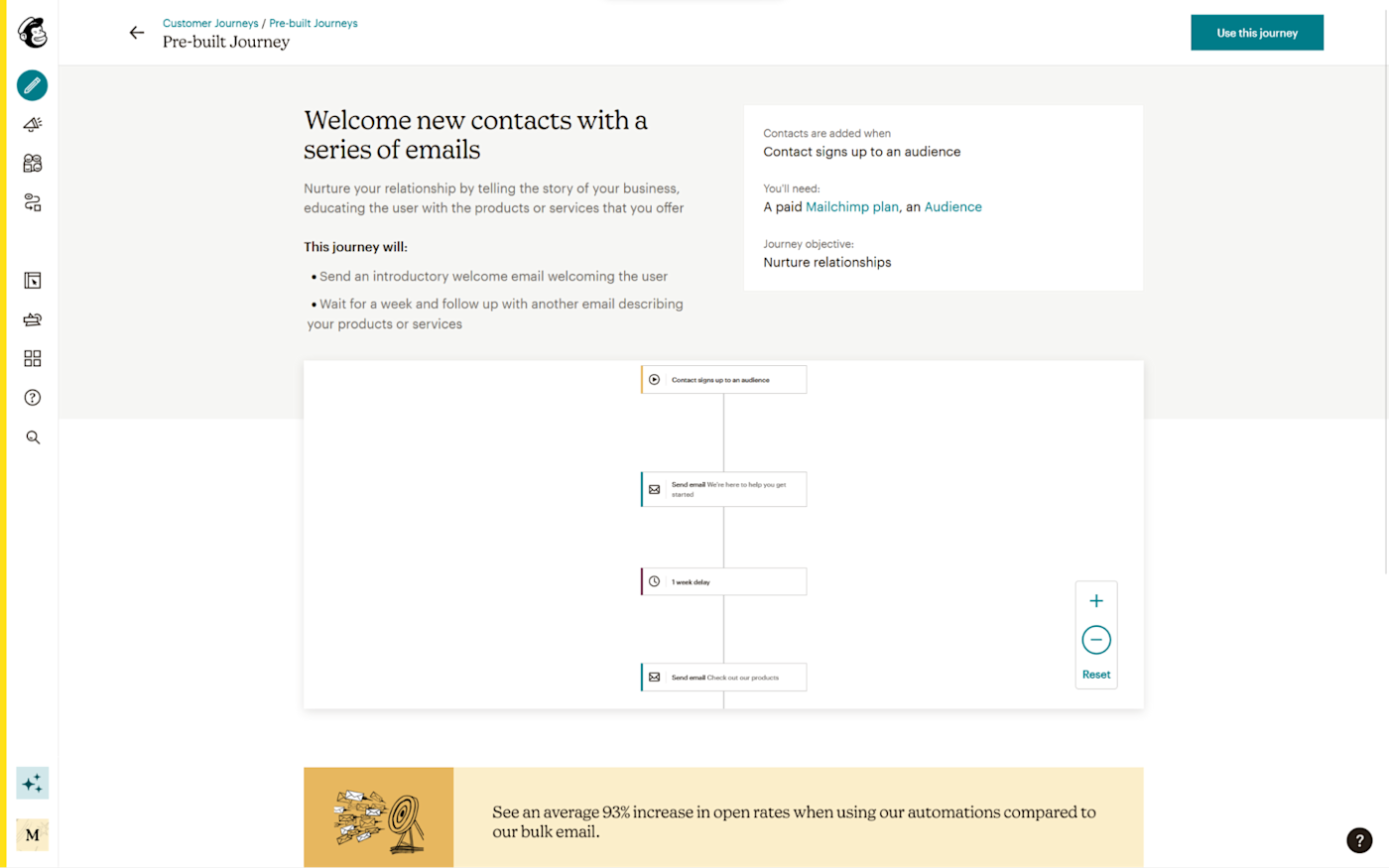
The time when Mailchimp was a modest email marketing tool is long gone. An Intuit app since last year, it’s growing a lot with new marketing features, and automation is included in the mix. A few weeks ago, I was working on a newsletter, and Mailchimp sent me a notification. “Want to try our revamped customer journey experience?” I did, and I was surprised by the changes.
The new page has a set of suggested drip campaigns you can run as if it were a little automation eShop. When you click on any of them, you get an overview of what the automation will do, what contacts will be targeted, what pricing plan you need to be in, and the overall objective of the campaign. Below that, you can see the whole journey along with the projected benefits. If the campaign you’re exploring is slightly off the mark, you can click on one of the three suggestions at the end of that page to find something more relevant.
While Mailchimp doesn’t have the largest library of the list, it has the easiest user experience and the template categories are useful. You can set up campaigns to find and welcome contacts, nurture leads, re-engage your audience, and manage your list. And as a robust marketing automation tool, Mailchimp also comes with loads of extras.
To automate things even more, you can connect Mailchimp with Zapier to get subscribers into Mailchimp automatically, from wherever your lead gen happens. Here are some examples.
Mailchimp pricing: Free plan available; the Essentials plan offers limited automation and starts at $11/month. To unlock all the drip email campaign features, you need to subscribe to at least the Standard plan, which starts at $17/month for 500 contacts. Pricing scales based on number of contacts.
Best drip email software for large lists and simple drip campaigns
Flodesk (Web)
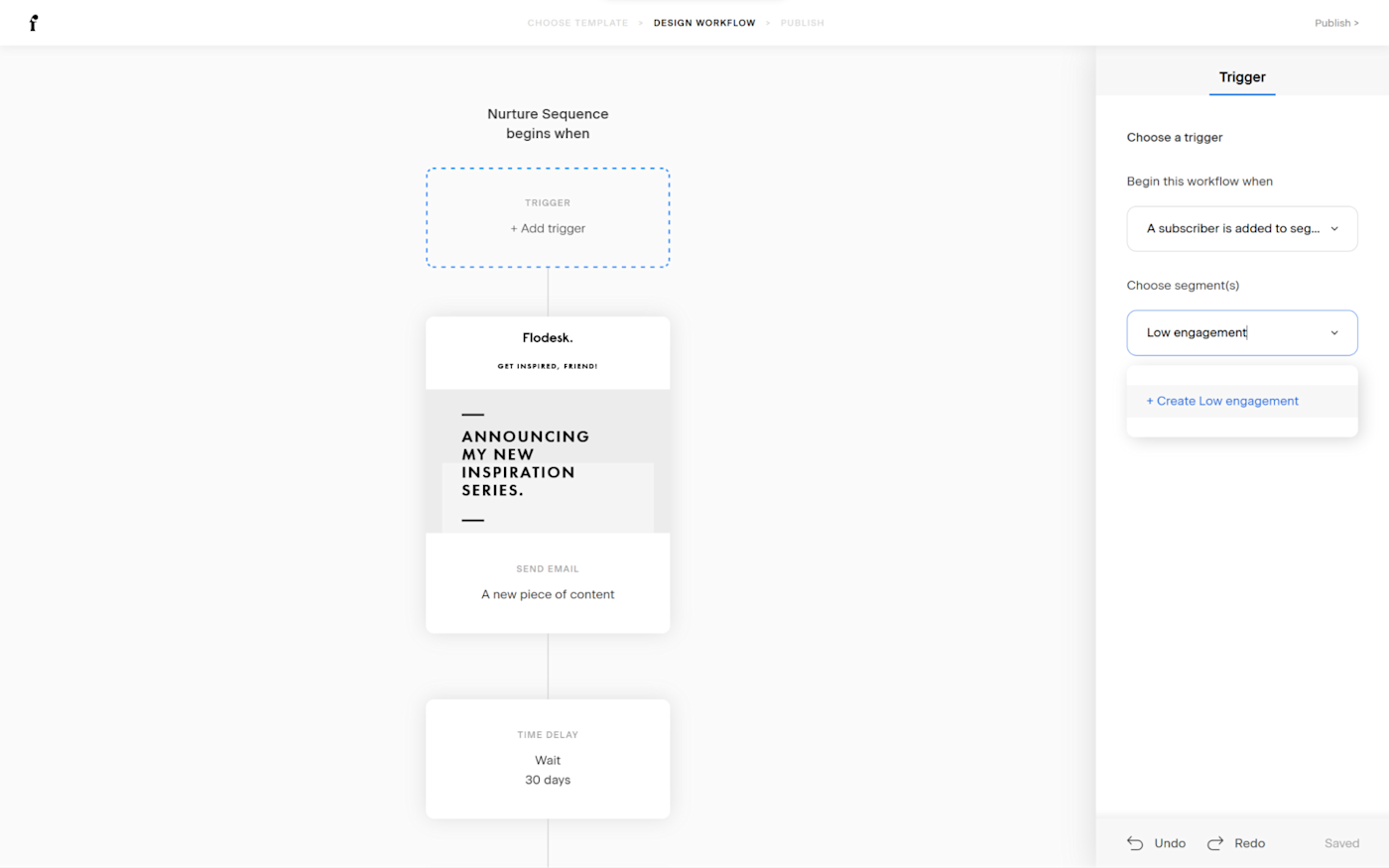
I don’t like being punished for growing. In other email marketing apps, the more contacts you add, the more you pay (generally). And if your subscribers need a lot of nurturing before sales happen, the ROI could take a while to come.
Flodesk says: “You know what? Let’s scrap all that.” For $38 per month, you can bring everyone and their cat into your list without worrying about limits. Simple, straightforward pricing lets you focus on segmentation, automation, and creating amazing offers for your audience.
The platform’s interface and user experience have a minimalism that I like, never overwhelming you with walls of controls. Setting up a drip campaign is a breeze, even if the features aren’t as deep as some of the competition. There’s one start trigger, four drip templates (nurture, welcome, lead magnet, and sales sequence), and the list of actions you can take will only help you segment your audience—not much else.
The email builder has beautiful templates to add to your drip campaign, mimicking the elegance of the platform. It’s easy to introduce personalization into your emails: you just have to start by typing @, select the field you want to place, and type in a fallback value, just in case your subscriber forgot to add their first name when they signed up.
Flodesk is solid in all other departments—analytics, for example, are simple, useful, and deep enough—and offers some cool extras of its own. In addition to managing your signup forms, you can also create landing pages to promote some of your best offers and see some stats about them right on their creation page.
To make Flodesk more powerful, connect it to Zapier, so you can send all your leads to Flodesk automatically and get those drips started. Here are a couple examples.
Flodesk pricing: Email plan costs $38/month for unlimited contacts.
Best email drip campaign software for solopreneurs and creators
ConvertKit (Web)
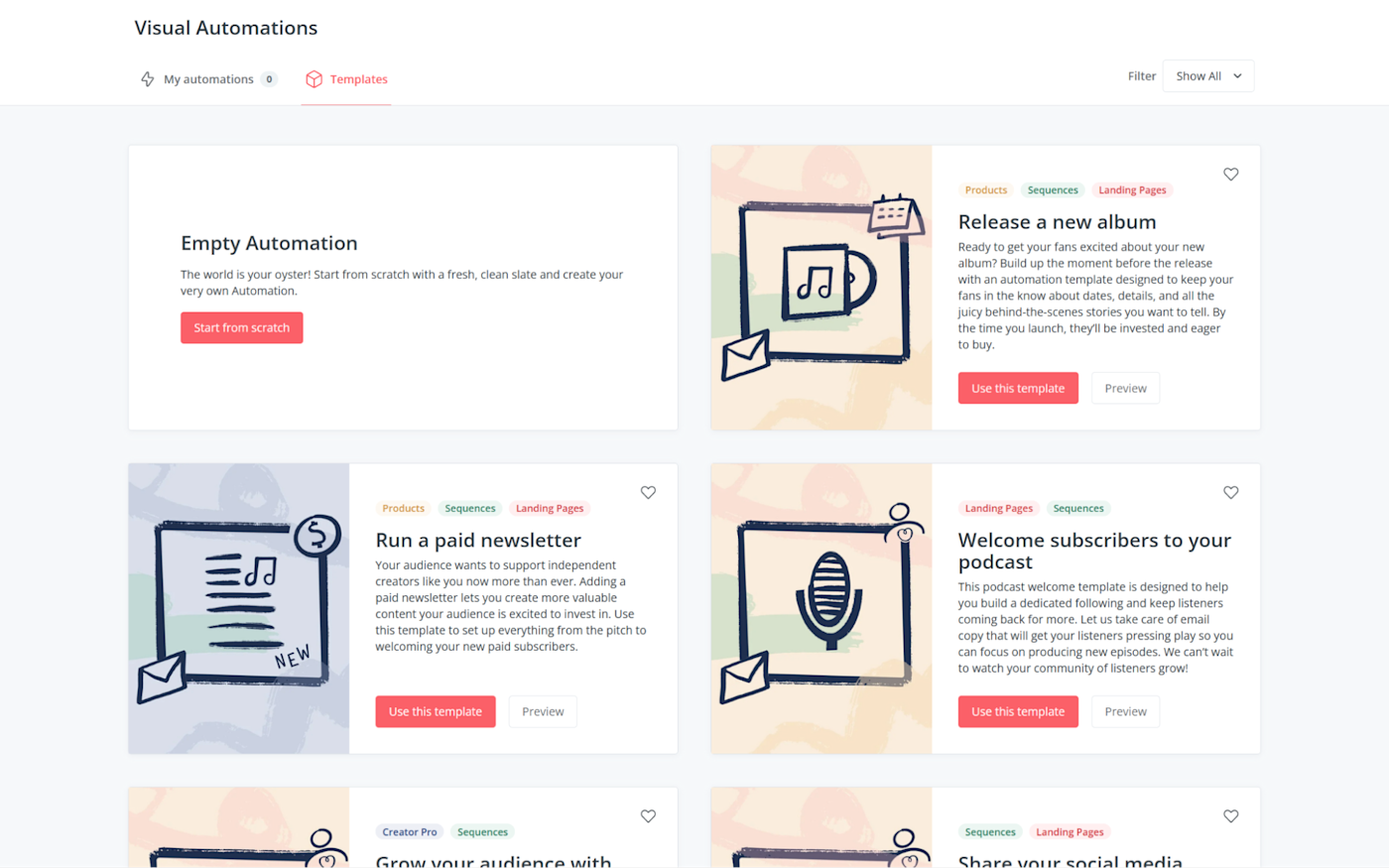
The founders hit the nail on the head when they named ConvertKit: it really feels like a kit of tools to help convert your audience into a delighted group of fans. If you monetize your creativity on the web, ConvertKit offers not only the drip campaign features you need, but also an entire suite of tools to empower your ideas.
There are two ways to set up automation in ConvertKit. The first one is by using Sequences, which are a way to line up emails based on a time delay and a list filter. You can use these to deliver an online course or set a subscriber on a nurture sequence. It’s simple to set up, but there isn’t much more you can do.
The real magic starts when you click the Automations tab. With 28 total templates, you can take the email sequences to new heights: promote your work on social media, welcome your podcast subscribers in a personalized way, or tease your new book by offering a free chapter on an email sequence.
These automations do more than just shoot emails and wait: you can connect landing pages, set up actions if your audience buys what you’re selling, and move subscribers from one automation to another. And if this isn’t enough, you can set up “if this, then that” conditional rules for subscribers clicking links on your sales channels, helping you automate and organize your lists even more.
To help with the sales, ConvertKit Commerce lets you integrate Stripe to sell products anywhere, even on the emails you send, reducing friction in transactions and making sales more natural as you talk about what you do and how you do it. That’s not the only extra, though: you can set up products and subscriptions, create a tip jar if you have a generous audience, and create a range of content snippets, letting you save time if you reuse information.
Beyond Stripe, ConvertKit has a decent set of native integrations, but you can connect it to Zapier to make it do even more for you. Here are a couple of examples to get you started.
ConvertKit pricing: Free plan available; Creator plan starts at $15/month, and pricing scales based on number of contacts ($79/month for 5,000 contacts).
Best email drip software for advanced drip automations
ActiveCampaign (Web, iOS, Android)
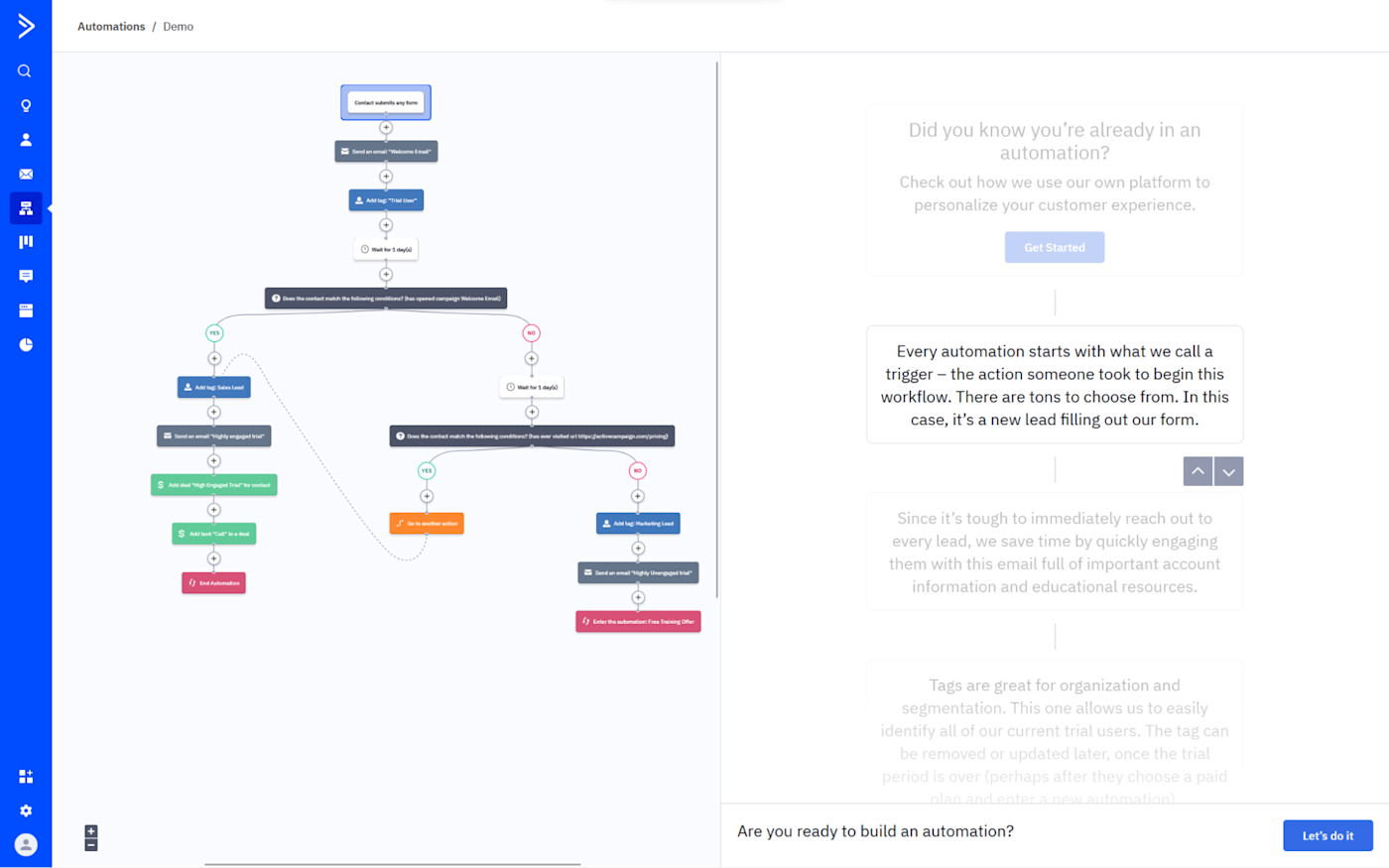
ActiveCampaign is a powerful tool. The range of triggers, conditions, and actions it offers on the automation builder is unmatched by any of the other apps on this list. Some unique examples: you can add a subscriber to a drip campaign when they forward an email, visit a page on your website, or their lead score changes. And that’s just the tip of the iceberg—when you dive in, you’ll find over 500 automation recipes to explore.
The power that the platform thrusts into your hands may be a bit overwhelming at the start. After all, it’s not just an email marketing platform—it brands itself as a customer experience automation (CXA) platform. Some examples:
-
It has basic CRM features that help you track deals and close more sales.
-
It lets you connect your website with a tracking code to start gathering data there.
-
It helps you keep in touch with your audience with a web live chat widget and messenger integrations.
And you can have all these features play together when you set up automation.
When you finish creating your account, you can take a sneak peek at how ActiveCampaign handles its own onboarding automation. Now that you’ve signed up, you’ll get a welcome email and a “trial user” tag. The automation waits for one day. If you open the welcome email, you get tagged as a “sales lead” and will receive an email optimized for highly involved trial users. A deal is then added to the CRM, letting the ActiveCampaign sales team know they should follow up. But what happens if you don’t open the email? In that case, the automation will send you an email targeting unengaged users and offer free training.
When it’s time to build your own, it’s surprisingly accessible, considering the depth. There’s a unique feature that I didn’t find in the other apps on this list (at least not as clearly as it’s implemented here): you can add an event called “Goal,” which serves as an objectives tracker. If the objective is met—say, the customer buys a seat in your workshop—you can have the automation skip the rest of the nurturing sequence, and instead add them to the workshop preparation sequence.
To help drive that ROI, you can connect ActiveCampaign with Zapier, too. Expand your subscriber list by bringing leads in from wherever they originate.
ActiveCampaign pricing: Lite plan starts at $15/month for 500 contacts, and pricing scales based on number of contacts ($99/month for 5,000 contacts); if you want to leverage eCommerce, analytics, SMS marketing, and abandoned cart automation, you need to be on at least the Plus plan, which starts at $70/month for 500 contacts ($287/month for 5,000 contacts).
Best drip email app for eCommerce
Omnisend (Web)
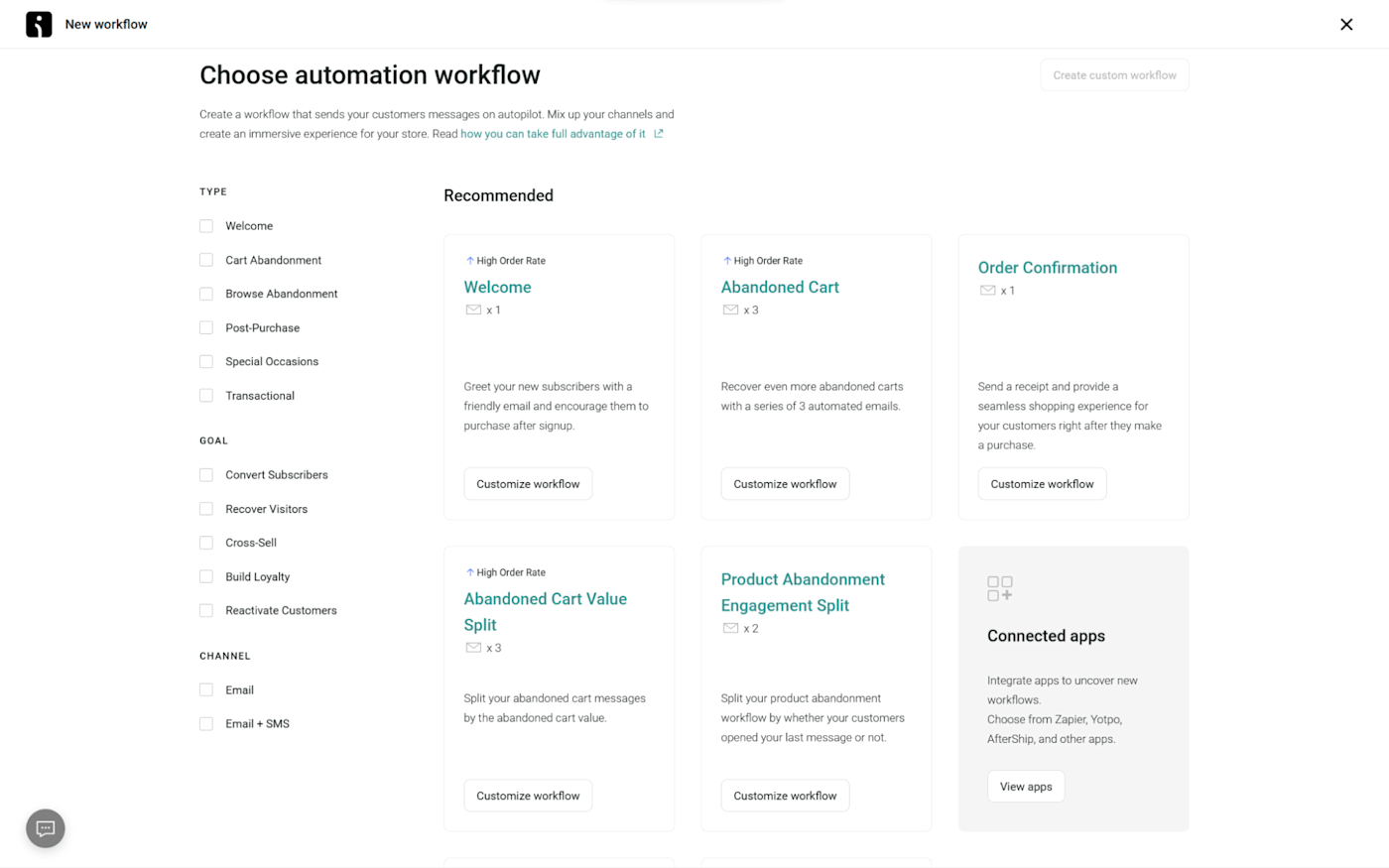
The way Omnisend gets eCommerce is uncanny. The level of integration it has with your shop is amazing, and it caters to your needs as an online retailer in a way no other app on this list does.
Example: if you’re having trouble with lead generation, Omnisend will help you set up cool campaigns on your store to get your customers in the door. Out of all the options, the one that caught my eye was the wheel of fortune campaign. The wheel is divided in slices. You can assign each one a discount, free shipping, or something else. Set up the likelihood that customers will land on each of the slices by adjusting the percentage, and customize the losing slice’s text (don’t worry, the marker will never land there—it’s not possible to lose). When you implement it on your website, your visitors can trade their email for a spin, which increases not only your list, but also the likelihood of a first sale. Setting up these campaigns is fast, there are lots of templates, and the visual builder is easy and intuitive.
Now that your list is growing, you may notice there’s the forgetful bunch. They add products to the cart but then go out to walk the dog and forget all about it. Omnisend leverages the data from your eCommerce platform to identify these subscribers, so you can send them a friendly reminder. Not only that, but you can also offer an additional discount or suggest a couple of products that go well with what’s already in the cart.
Dashboards focus a lot on the sales you’ve made so far, with a live view of what’s happening on your website—as if you were sitting in a physical shop looking at people go in and out—as well as advanced reporting for campaigns and workflows. All this data can then be used to segment your audience based on lifecycle stage, from new customers to loyal fans.
Another powerful feature here is how you can create emails with dynamic content, taking personalization to the next level. Forget “Hi, Jessica”:
-
Create a new drip campaign with 5 different offers for 5 different subscriber segments
-
Send the campaign to your list
-
Each subscriber gets the offer that makes more sense based on what they’re looking for
Keep delighting your customers without extra work by connecting Omnisend with Zapier. Pull in subscribers from wherever they are, so you’re always working with an updated list.
Omnisend pricing: Free plan available; Standard plan starts at $16/month for 500 subscribers, and pricing scales based on number of contacts and email volume, ($70/month for 5,500 contacts and 66,000 emails).
Best drip email software for optimizing campaigns with A/B testing
Klaviyo (Web)
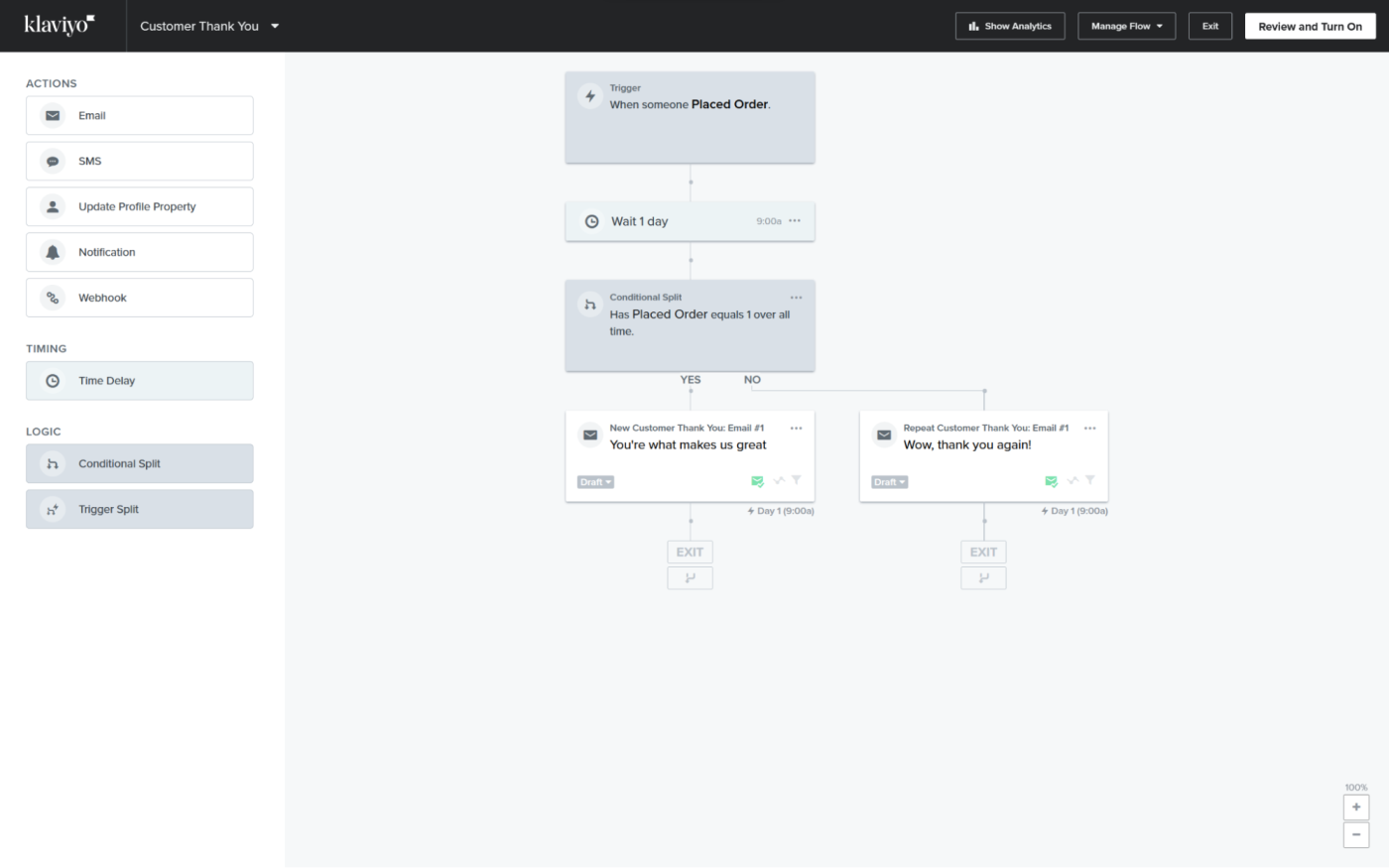
It’s true that other platforms also support A/B testing, but none do it with the same ease as Klaviyo. Plus, it offers the analytics to back it up, so you can use your A/B testing results to make decisions.
Like all brainy apps on the market, Klaviyo sports its minimalist look with confidence. It lets you build your drip automations with a simple and powerful interface, dragging and dropping actions, timing, and logic steps into place. When you’re done and hit Turn on, the real game begins.
Under the Analytics tab, click Dashboards. There, you have a pre-made dashboard with core stats to analyze your campaigns. Not useful? Edit the dashboard however you like, adding or removing stat cards based on your needs. You can even create your own dashboards and save them, so you can look at the data from more than one angle without setting it up every time.
As for the actual statistics inside your automations (Klaviyo calls them flows), you can click on the step you want to know more about, and you’ll be able to see 30-day analytics of deliveries, opens, and clicks—and you can set up a custom metric. You can go from there to the Analytics tab directly, or you can use this information to make the necessary changes right there. Can you optimize the subject line? Is this email preview working? Is this first paragraph magnetic?
While the steps to set up A/B testing in a regular email campaign are really easy and intuitive, doing so inside an automation isn’t as clear. Let me save you a couple of Google searches: here’s how to A/B test your flows.
To get even more from Klaviyo, integrate it with Zapier to connect your drip email tool with the rest of your tech stack.
Klaviyo pricing: Free plan available; Email plan starts at $20/month for 500 contacts, and pricing scales based on number of contacts ($110/month for 5,000 contacts).
Best drip email software for leveraging your tech stack
Encharge (Web)
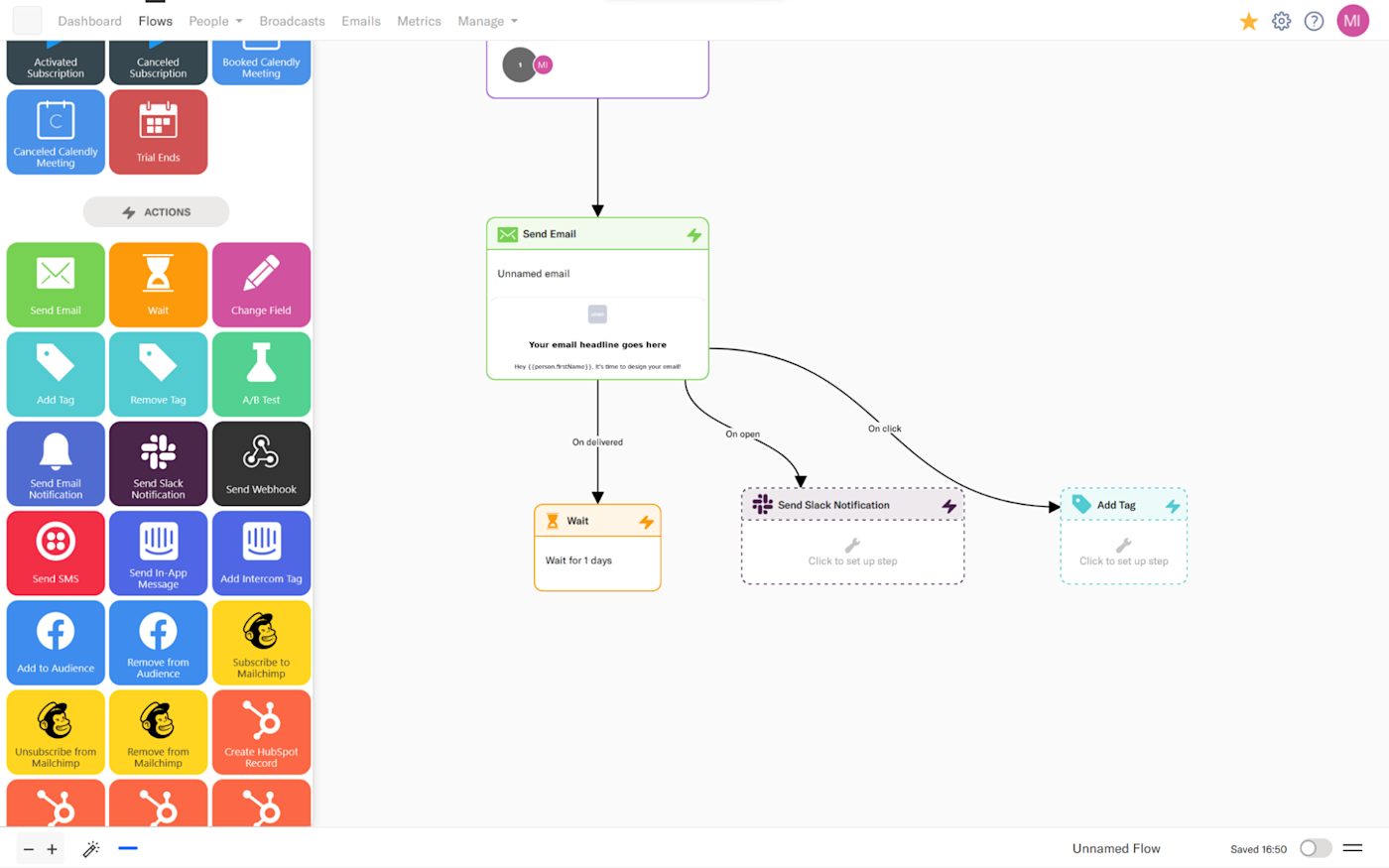
Don’t quote me on this, but I’m pretty sure Encharge pitches their app like this: “It’s like Zapier, but for drip email.”
Instead of automating processes across your apps like Zapier, Encharge lets you add steps and triggers on your drip campaigns based on data and events sourced from any connected app. Then, you can use that data to send emails, segment your audience, and make things happen on your Slack or your HubSpot CRM account, for example. There’s a real open-sky feeling here: the only limit is how creative you can be.
The automation builder is flexible and intuitive. There are some quirks in the user interface that need some hammering: if you’re having trouble deleting a step, make sure your mouse travels directly from above the card to the bin icon. If you’re not precise, the button disappears quickly. Other than that, I love the way you can hover over an email step and drag connections based on whether the email is delivered, read, opened, or something is clicked.
I had a lot of fun with the embedded copy generator, which can be great to get your writing going. Encharge has an OpenAI GPT-3 key—access to an artificial intelligence-based text generator—that can generate email outlines and subject lines, write the entire thing for you, or optimize what you wrote.
While Encharge already has a good collection of native integrations to get you started, you can add more building blocks by connecting it to Zapier. That will add thousands of apps to the mix, so you can set up your drip campaign just the way you want. For example, you can add new Encharge people to LinkedIn Matched Audiences or your CRM.
Encharge pricing: Growth plan starts at $99/month for 2,000 contacts, and pricing scales based on number of contacts ($179/month for 5,000 contacts).
Best drip email software for multichannel drip campaigns
Freshmarketer (Web, iOS, Android)
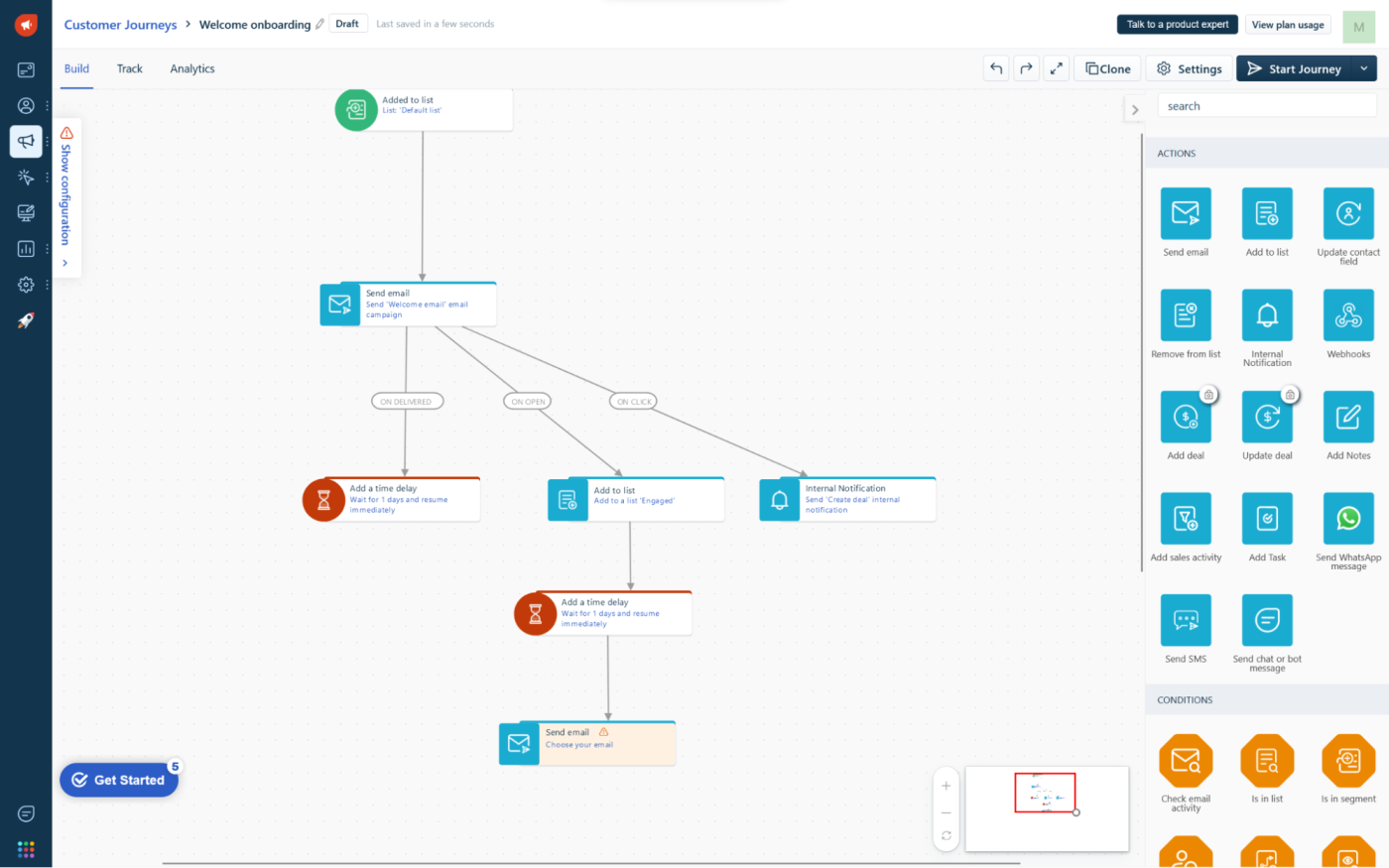
Who said that drip campaigns have to stick to email? Freshmarketer lets you connect with your audience wherever they may be: your website, WhatsApp, Facebook, Instagram, and even Google and Apple Business messages.
The app’s interface is sharp, and as you hover over the icons on the left-side menu, you’ll see there’s a lot to discover. You can segment your contacts into lists and associate them with accounts, if you work with that kind of setup; you can create simple landing pages starting from one of 12 templates; and if you dive into the settings, you’ll also be able to show and hide buttons on the menu.
But where Freshmarketer shines is in the Marketing Automation tab. Customer journeys, the name for drip campaigns here, has 50 playbooks across multiple channels, letting you send order confirmations via WhatsApp, ask for feedback via SMS, and trigger bot campaigns on your website, to name a few. If you have something specific in mind, you can start from scratch and use the visual builder to connect with your audience through any of the supported channels.
While customer journeys cover all the channels, you can run more targeted campaigns on each of them too. There’s a page to set up WhatsApp campaigns, another one for SMS, and even a place where you can run your social media accounts. You can even create a chatbot to automate parts of the conversation. There are many templates to start from, and you can edit the flow of the interaction in another visual builder. When you’re done, deploy the bot by copying and pasting code to your website or directly into any of the channels you have set up.
As you’re connecting all the channels, you can also connect Freshmarketer to Zapier to make sure all your contacts are where they need to be. Here are some examples.
Freshmarketer pricing: Free plan available; Growth plan starts at $19/month, and pricing scales based on number of contacts ($100/month for 5,000 contacts as an add-on).
Best free drip email software for unlimited contacts
Sendinblue (Web, iOS, Android)
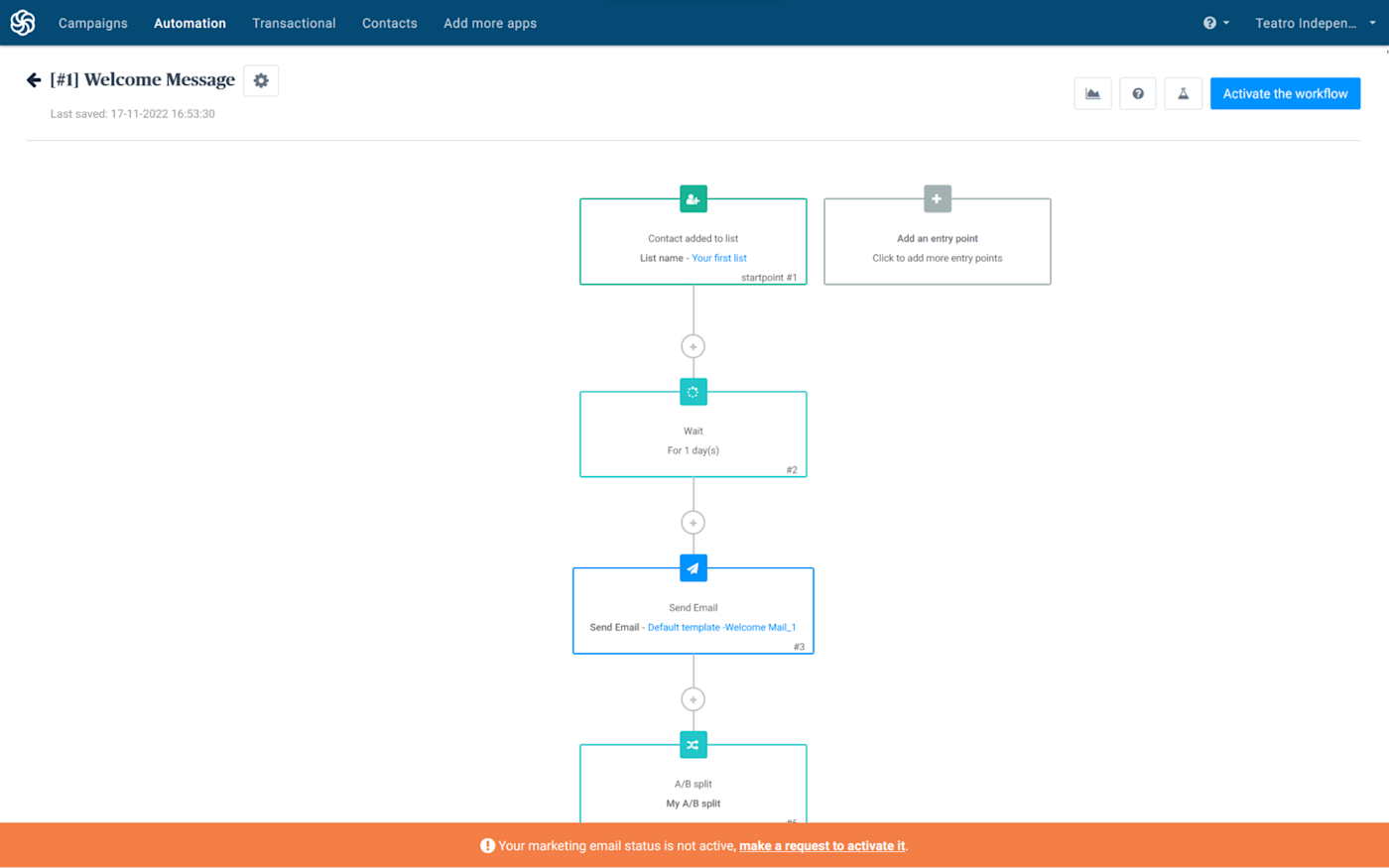
Don’t be fooled by Sendinblue‘s simplicity. You’ll be surprised to find great drip automation features, solid audience segmentation, and basic analytics in a free plan with no contact limits. The limit is in how many emails you can send per day: 300.
There’s a lot to explore before you actually have to pay. The user interface is functional and fast, without the bells and whistles of some of the competition. Learning the ropes of setting up a drip campaign is fast, and the range of triggers/actions/logic available is quite varied for a free plan. You can, for example:
-
Start an automation when a contact visits a page on your website
-
Add an A/B split anywhere on your campaign, letting you optimize the process
-
Jump to another step in the current automation, or even trigger another automation you’ve set up before
The pricing revolves around monthly email volume instead of contacts, so you never have to worry about bringing new people in. The lowest paid plan, Starter, lets you send 20,000 emails per month without daily limits for $25/month, but doesn’t add much else in terms of functionality. Sendinblue does have some extras to pack in, though: you can embed a chat widget on your website and leverage sales CRM features for free, no matter which plan you’re on.
If you’re collecting free software plans to build a business with zero budget, you can connect Sendinblue with Zapier, so your drip email is connected to all the other apps you use.
Sendinblue pricing: Free plan available; Starter plan includes 20,000 emails/month for $25/month, and pricing scales based on monthly email volume.
Best free drip email software for sending lots of emails
MailerLite (Web, iOS)
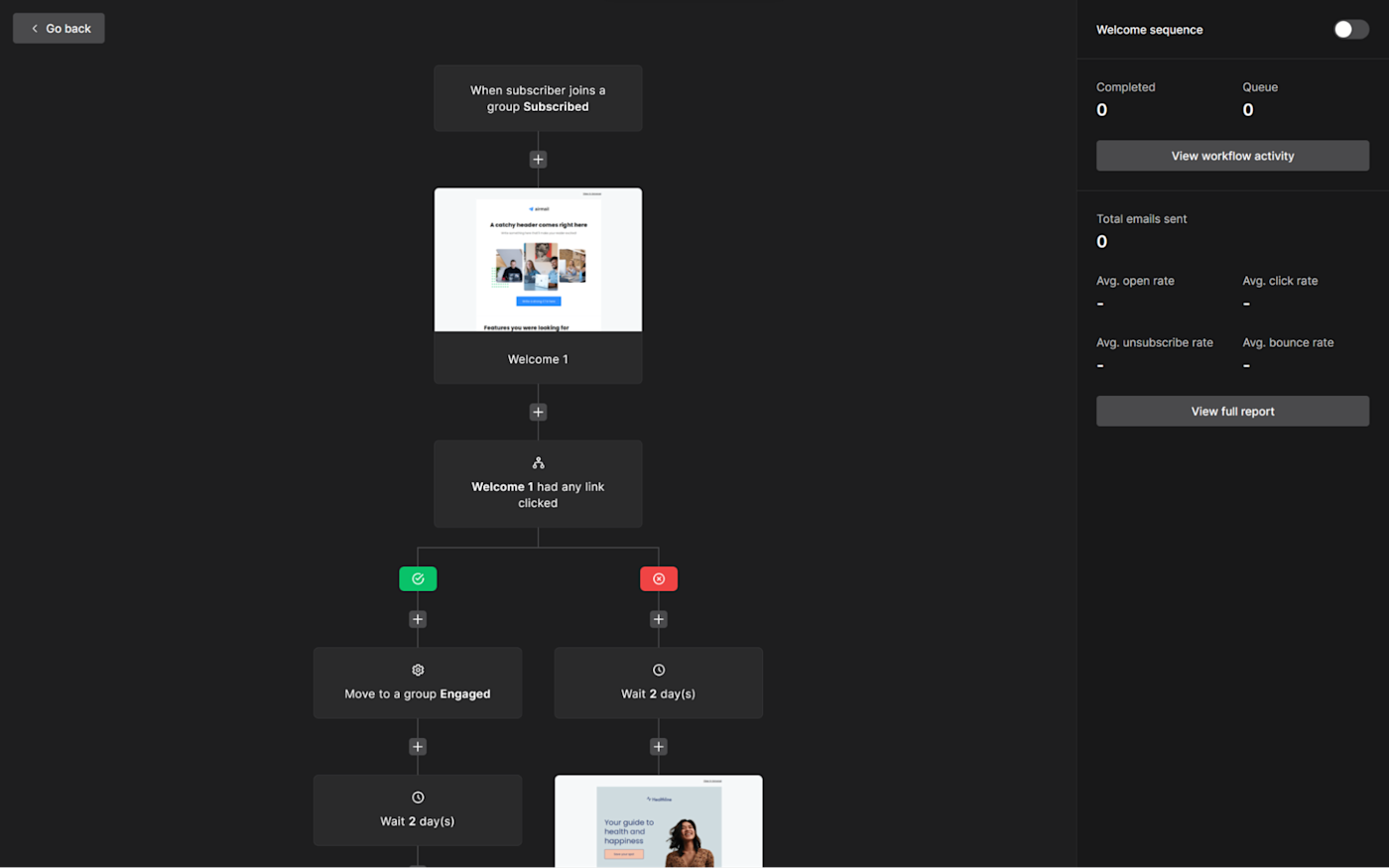
MailerLite offers another competitive free plan. You’ll get 12,000 monthly emails for 1,000 subscribers, unlimited segmentation, 1 free website, 10 landing pages, unlimited email automation (but you can only set one start trigger per automation), and detailed analytics. Sendinblue gives you more drip campaign features with no contact limits for free, but MailerLite takes away the email limits and offers more extras and slightly better analytics.
The user experience is polished, and the drip campaign builder—accessible by clicking the Automations tab—has all the basics you need to welcome your contacts, nurture them, and keep them in the loop. A less common trigger you’ll find here is the date/anniversary trigger, where you can set a specific time interval or day in the calendar to start an automation. And to help keep things on track, MailerLite lets you know if there are unconfigured steps, so you can be sure everything’s ready when you click Save.
To take your automation to the next level, you can connect MailerLite to Zapier to be sure your entire tech stack is connected.
MailerLite pricing: Free plan available; Growing Business plan starts at $10/month, and pricing scales based on number of contacts ($32/month for 5,000 contacts).
What is the best drip campaign software?
Ultimately, it’s your call: do you want something affordable? A Robin to your eCommerce Batman? Something to optimize all your campaigns? There are drip marketing tools for every niche, and all of the options above have either a free plan or a free trial, so you can drive them around the block and decide if they’re in for the long haul.
Related reading:
This article was originally published in February 2015 by Matthew Guay and has also had contributions from Maria Myre. The most recent update was in December 2022.
[adsanity_group align=’alignnone’ num_ads=1 num_columns=1 group_ids=’15192′]
Need Any Technology Assistance? Call Pursho @ 0731-6725516







